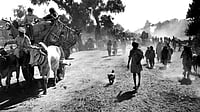'The Whispering Chinar' paints a picture of Charbagh, village of the author Ali Rohila's own creation, set in the Pakhtunkhwa province. There is an unexpected thrust in every story of this book.
Title: The Whispering Chinar
Author/Publisher: Ali Rohila, Vintage Books
Even though the word ‘chinar’ automatically evokes Kashmir to most Indians picking up the book, this is actually a series of 11 stories set across the border, in or connected to the village of Charbagh where, as in all such villages, there is a mix of people, some related to the ailing Khan Sahib, the landlord of the village, along with the villagers that reside alongside the landowner’s property. We follow many of the characters from story to story through a thread of life and values linked to Charbagh.
Charbagh is a village of Rohila’s creation, set in the Pakhtunkhwa province. As is the case with closed communities in South East Asia, politics swarm, whether it is the politics of inheritance, religion or love with its attendant desire, makes little difference. Rohila portrays a group of people who are intensely fallible and driven by ego. In some cases like the village imams, who are madrassa taught, a learning that begins with ‘certainty and ends with certainty’ that treads the extremities of faith and issues like whether the viewing of the moon can be seen as a matter of religion or not. Even a good teacher can fall prey to the madrassa rigidity as happens to Scotland-returned Junaid who fails to realize that he is trespassing on forbidden ground with his attempts to broaden his students’ minds.
While women seem to have slightly more freedom than before, they can work in corporate offices and in some cases, choose their own partners, they are still in the grip of patriarchy and love in these stories is, for the most part unrequited. The landlord’s cousins are at loggerheads over property with its infinite ramifications. In the tears of Naso, a love affair between young cousins that begins outside Charbagh, with marriage as the aim and sends the cousins flying in the face of family and background issues, is reduced to an unbelievable meltdown since forbidden love ultimately comes down to who inherits what.
Ashfaq Khan the village landowner’s brother-in-law is the one character in the stories who are not swayed by corruption. However, his impulses towards good are not always successful - simply because Ashfaq lacks the authority to impose his will on the situations that he tries to salvage. He does his best, trying to rescue musicians who have roused the imam’s ire by giving them a place to recite in his hujura or by questioning matters of blind faith. Ashfaq Khan lives with the rest of the Khan family in a rambling old mansion in the shade of a chinar tree - the whispering chinar of the title and the first story – that is separated from the village by a wall topped with barbed wire as in all such houses.
Ali Rohila brings a new voice to Pakistani writing with his linked narrative about the way people change when push comes to shove. We tend to forget that it doesn’t take a politician or feudal lord to be corrupt. Corruption lurks in the lower echelons of privilege as well, whether urban or rural - and rural Charbagh has its links to the wider world of Rawalpindi and, on occasion Muscat, and even Scotland.
Rohila has the habit of taking the reader by surprise with an unexpected thrust in every story. Good intentions are no protection at all since people fail to realize what can result from actions not thought through. There is a foreboding in his style which creates a warning system – we know that things will not end well and sure enough that is what happens. Sometimes this seems all too predictable, but the characters linger with the warnings that they hold up for the edification of similar unthinking people who make the mistake of thinking that their elite status is enough. In the end, it is the storytelling that holds sway and the realization that Pakistani fiction is entering a new dimension which can look at matters of faith unflinchingly.


























